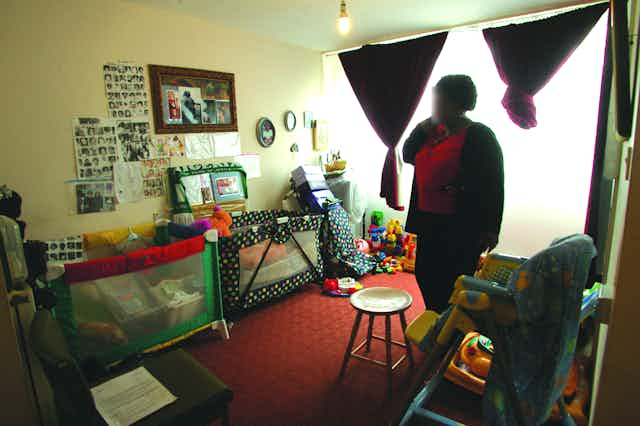The government intends the much-debated bedroom tax to encourage social tenants to leave properties that are too large for them. Opponents say it intrudes into the personal lives of some of Britain’s most vulnerable people.
But there is a further - maybe unexpected - consequence to this harsh new policy that has not yet been aired. Cutting the benefits of social tenants with a spare room makes life more difficult for those who currently work in their homes - or for those who would like to.
This goes against the government’s supposed determination to get people off benefits and into employment. It also represents a broken promise to stop discrimination against people working in their social housing.
A century of hard work
Home-based work has been banned in UK social housing for more than a century. This is because when the London slums were razed at the turn of the 20th century, the issue was elided with problems of severe overcrowding and poor sanitation.
In reality only a few occupations - such as “fur-pulling” from raw hides - were unsuited to being carried out in the home.
But the idea contradicted the Victorian concept of the home as a refuge from the male world of employment. And “sweated labour” - exploitation through unregulated and poorly paid piecework - was considered a scourge of the East End slum. Condemnation came from all sides.

Trade unions argued that when women earned money - mainly in the home because of their caring responsibilities - employers were let off paying men a living family wage. They also objected to home-based work because its lack of regulation led to the exploitation of some of the most vulnerable. And employers opposed home-based work because the increased control they had over factory workers resulted in greater profits.
Social reformers, too, opposed home-based work because of the horrific physical condition of the poorest dwellings. The prevalent conservative idea was that a woman’s place was in the home - their role restricted to domesticity and motherhood. This reinforced opposition to home-based work.
So the combined force of trade unions, employers, social reformers and conservatives worked to paint this working practice as a social evil. And as a result, the intricate jumbles of buildings, courts and yards that had supported myriad different home-based occupations were replaced by “model housing”. This was expressly designed to discourage such work - and managed through tenancy agreements that prohibited it.
A promise
In the 21st century the home-based workforce is growing rapidly - globally. The digital revolution has freed an increasing number of people from the need to work in a collective workplace, particularly in the service and information sectors.
And in 2010, the UK coalition government, recognising social tenants’ right to start businesses in their homes, pledged to lift the hundred year ban.
But little has been done to implement this - and there are a number of on-going problems. These include housing design, space standards, allocations policies and tenancy agreements that continue to discourage or prevent home-based work.
History repeating
The bedroom tax compounds this already difficult scenario, by penalising social tenants with a “spare bedroom”. In the private sector, home-based work is generally accommodated through under-occupation. People work in a spare bedroom, an underused dining room or garage, or in a shed at the bottom of their garden.
Preliminary findings of my research into home-based work in social housing - carried out in collaboration with sociologist Carol Wolkowitz - indicate that this tax places a further obstacle in the way of social tenants wanting to work, or start a business, in their home. Just as one barrier - historic tenancy agreements that prohibit home-based work - is removed, another is introduced.

Unemployment currently runs at twice the rate amongst social tenants as in the overall working population of the UK. The bedroom tax undermines the coalition government’s own policy to lift the century-long ban on residents of UK social housing starting businesses in their homes. Far from getting people working, this tax removes this option for some of the most deprived members of our society.
Social tenants with a spare bedroom will lose housing benefit. Low paid home-based work or a start-up business is unlikely - at least in the short-term - to cover the shortfall.
One type of home-based worker, the foster carer, has been granted immunity from this new tax. It is time for Chancellor George Osborne to extend this exemption to all home-based working residents of social housing.

